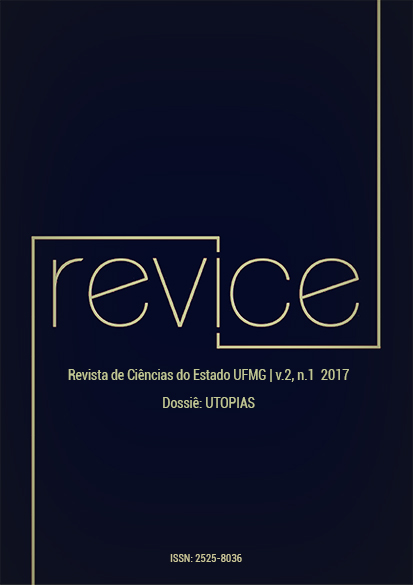The free republic of liberland
libertarian utopia
DOI:
https://doi.org/10.35699/2525-8036.2017.5025Keywords:
Utopia, Libertarianism, Minarchy, Anarcho-capitalism, SoberaniaAbstract
This article starts with a simplified analysis that seeks to delimit the key points of libertarianism as an ideology and its two main and diametrically opposed schools: minarchy and anarcho-capitalism. Afterwards, this article aims to report the facts surrounding the foundation of the Free Republic of Liberland, a state proclaimed between Croatia and Serbia by three friends in 2015, based on essentially libertarian aspects such as the absence of economic intervention by the state and the absence of non-voluntary taxes. During the analysis of the aspects that make up Liberland, this article aims, without any pretension of exhausting the themes, to expose significant social and legal implications that are, thanks to the technologies included in the formation of Liberland, unprecedented in the history of The National States.
Downloads
References
AGUIAR, Renan et al. Curso de Teoria Geral do Estado. Rio de Janeiro: Elsevier, 2009.
BASTIAT, Frédéric. A lei. São Paulo: Instituto Ludwig Von Mises Brasil, 2010.
BOBBIO, Norberto. A era dos direitos. Rio de Janeiro: Elsevier, 2004.
BRADBURY, Paul. As Liberland launches e-residency app, Croatian Media Interviews President Vit Jedlicka. 2016. Disponível em: <http://www.total-croatia-news.com/item/14672-as-liberland-launches-e-residency-app-croatian-media-interviews-president-vit-jedlicka>. Acesso em: 20 nov. 2016.
CONSTANT, Benjamin. Da liberdade dos antigos comparada à dos modernos. 1980. Disponível em: <http://www.fafich.ufmg.br/luarnaut/Constant_liberdade.pdf>. Acesso em: 19 nov. 2016.
ECKARDT, Andy. Welcome to Liberland: The Tax-Free Startup State Between Croatia and Serbia. 2016. Disponível em: <http://www.nbcnews.com/news/world/welcome-liberland-tax-free-startup-state-between-croatia-serbia-n555246>. Acesso em: 20 nov. 2016.
FONTINELLE, Amy. What exactly is a startup? 2016. Disponível em: <http://www.investopedia.com/ask/answers/12/what-is-a-startup.asp>. Acesso em: 20 nov. 2016.
FREE REPUBLIC OF LIBERLAND. About Liberland. 2016a. Disponível em: <https://liberland.org/en/about/>. Acesso em: 20 nov. 2016.
FREE REPUBLIC OF LIBERLAND. Free Republic of Liberland Constitution Draft. 2015. Disponível em: < https://liberland.org/en/constitution/>. Acesso em: 20 nov. 2015.
FREE REPUBLIC OF LIBERLAND. President in Brazil. 2016b. Disponível em: <https://liberland.org/en/news/president-in-brazil-139.htm>. Acesso em: 20 nov. 2016.
FRIEDMAN, Milton. Milton Friedman Predicts the rise of Bitcoin in 1999! 0’08’’. Disponível em: <https://www.youtube.com/watch?v=6MnQJFEVY7s>. Acesso em: 20 nov. 2016.
GREENBERG, Andy. Prosecutors Trace $13.4M in Bitcoins From the Silk Road to Ulbricht’s Laptop. 2015. Disponível em: <https://www.wired.com/2015/01/prosecutors-trace-13-4-million-bitcoins-silk-road-ulbrichts-laptop/>. Acesso em: 20 fev. 2017.
GUSTIN, Miracy Barbosa de Sousa; DIAS, Maria Tereza Fonseca. (Re)pensando a pesquisa jurídica: teoria e prática. 3ª. ed. Belo Horizonte: Del Rey, 2010.
HAYEK, Friedrich August. O caminho da servidão. São Paulo: Instituto Ludwig Von Mises Brasil, 2010.
JENKINS, Jolyon. The man who created a tiny country he can no longer enter. 2016. Disponível em: <http://www.bbc.com/news/magazine-37941931>. Acesso em: 26 nov. 2016.
JOUVENEL, Bertrand de. O poder – história natural de seu crescimento. São Paulo: Peixoto Neto, 2010.
KELSEN, Hans. Teoria Geral do Direito e do Estado. São Paulo: Martins Fontes, 2010.
MACEDO, Daniel. Liberland: o país sem governo e sem cobrança de impostos. 2016. Disponível em: <http://veja.abril.com.br/mundo/liberland-o-pais-sem-governo-e-sem-cobranca-de-impostos/>. Acesso em: 20 nov. 2016.
MICHAELIS. Dicionário Brasileiro da Língua Portuguesa. 2017. Disponível em: <http://michaelis.uol.com.br/busca?r=0&f=0&t=0&palavra=utopia>. Acesso em: 22 fev. 2017.
MISES, Ludwig Von. Ação humana – um tratado de economia. São Paulo: Instituto Ludwig Von Mises Brasil, 2010.
MOLINARI, Gustave de. The production of security. Alabama: Mises Institute, 2009.
MORE, Thomas. Utopia. Brasília: Editora Universidade de Brasília, 2004.
NOLAN, Daniel. Liberland: hundreds of thousands apply to live in world’s newest “country”. 2015. Disponível em: <https://www.theguardian.com/world/2015/apr/24/liberland-hundreds-of-thousands-apply-to-live-in-worlds-newest-country>. Acesso em: 20 nov. 2016.
NOZICK, Robert. Anarchy, State, and Utopia. Oxford: Blackwell, 2011.
ONU. Capítulo 1. 2016. Disponível em: < https://nacoesunidas.org/carta/cap1/>. Acesso em: 20 nov. 2016.
PLATÃO. A República. São Paulo: Martin Claret. 2014.
REDMAN, Jamie. Liberland: Bitcoin ‘Is Truly the Base of Our Economy’. 2016. Disponível em: <https://news.bitcoin.com/liberland-bitcoin-truly-base-economy/>. Acesso em: 20 nov. 2016.
ROSSMAN, Gabriel. Extremely Loud and Incredibly Close (But Still So Far): Assessing Liberland’s Claim of Statehood. Chicago Journal of International Law. Califórnia, v. 17, n.1, jul. 2016.
ROTHBARD, Murray Newton. A anatomia do Estado. São Paulo: Instituto Ludwig Von Mises Brasil, 2012.
ROTHBARD, Murray Newton. A ética da liberdade. New York: Ludwig Von Mises Institute, 2002.
ROTHBARD, Murray Newton. For a new liberty – the libertarian manifesto. São Paulo: Instituto Ludwig Von Mises Brasil, 2010.
STRINGHAM, Edward Peter. Private governance – creating order in economic and social life. New York: Oxford University Press, 2015.
ULRICH, Fernando. Bitcoin - A moeda na era digital. São Paulo: Instituto Ludwig Von Mises Brasil. 2014.
WITKER, Jorge. Como elaborar una tesis en derecho: pautas metodológicas y técnicas para el estudiante o investigador del derecho. Madrid: Civitas, 1985.
Downloads
Published
Issue
Section
License
Copyright (c) 2017 Rômulo Inácio da Silva Caldas

This work is licensed under a Creative Commons Attribution-NonCommercial-ShareAlike 4.0 International License.
1. Os conteúdos dos trabalhos são de exclusiva responsabilidade de seu autor.
2. É permitida a reprodução total ou parcial dos trabalhos publicados na Revista, desde que citada a fonte.
3. Ao submeterem seus trabalhos à Revista os autores certificam que os mesmos são de autoria própria e inéditos (não publicados em qualquer meio digital ou impresso).
4. Os direitos autorais dos artigos publicados na Revista são do autor, com direitos de primeira publicação reservados para este periódico.
5. Para fins de divulgação, a Revista poderá replicar os trabalhos publicados nesta revista em outros meios de comunicação como, por exemplo, redes sociais (Facebook, Academia.Edu, etc).
6. A Revista é de acesso público, portanto, os autores que submetem trabalhos concordam que os mesmos são de uso gratuito.
7. Constatando qualquer ilegalidade, fraude, ou outra atitude que coloque em dúvida a lisura da publicação, em especial a prática de plágio, o trabalho estará automaticamente rejeitado.
8. Caso o trabalho já tenha sido publicado, será imediatamente retirado da base da revista, sendo proibida sua posterior citação vinculada a ela e, no número seguinte em que ocorreu a publicação, será comunicado o cancelamento da referida publicação. Em caso de deflagração do procedimento para a retratação do trabalho, os autores serão previamente informados, sendo-lhe garantido o direito à ampla defesa.
9. Os dados pessoais fornecidos pelos autores serão utilizados exclusivamente para os serviços prestados por essa publicação, não sendo disponibilizados para outras finalidades ou a terceiros.



